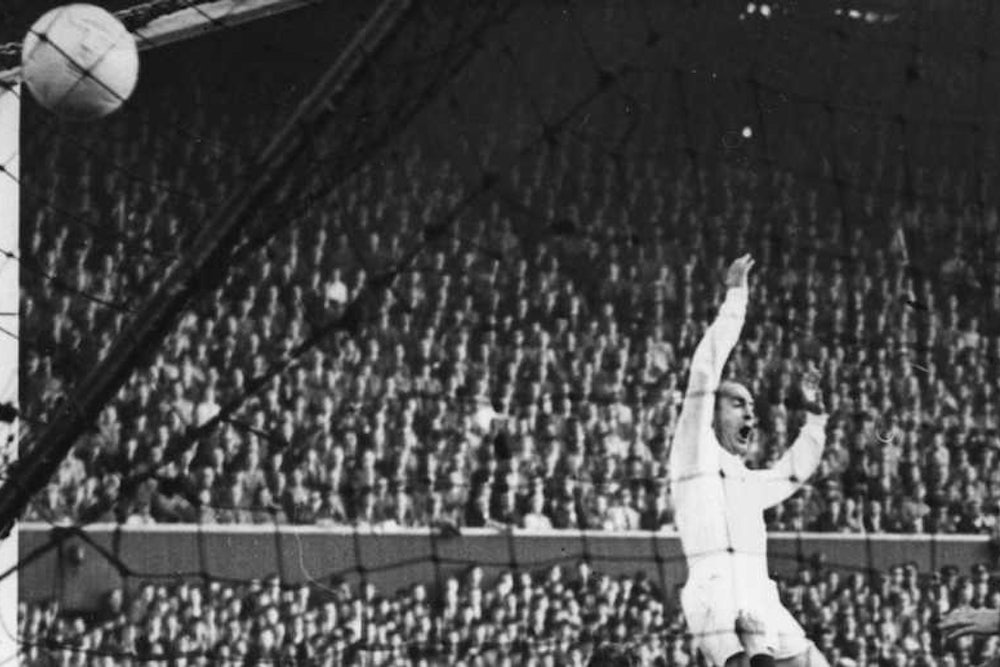Alfredo Di Stefano never played a game in the World Cup—his Argentina was ruled out of the Cup for infractions; and when he could have played for Spain, he was injured or they failed to qualify. It doesn’t matter. Blond, losing his hair, not athletic-looking, but endlessly fast, effortlessly balanced, and as greedy for goal as Arjen Robben, he was the essential figure in the dawning of international club soccer. Di Stefano led Real Madrid in the era when they won the European Cup (now the Champions League) five times in a row, from 1955 to 1960.
Who needs the European Cup?—that was what Chelsea said in 1955 when they won the English League, Division 1, as it was then known. They couldn’t be bothered to enter the Cup. It was true that in 1953, at Wembley Stadium, the Hungarian team had come visiting, running and wandering, and beaten the stalwart lads 6-3 (with Ferenc Puskas as their leader). The writing was on the wall and on the grass—there were other ways of doing soccer not confined to brute strength, kicking the ball downfield, and putting in endless crosses. In England, players played their positions, like chess-men on their squares: our right-back marked their left-winger—and so on. But suppose they didn’t seem to have a left winger, just four or five different guys who might appear at outside left? Puskas did that, for Hungary, with Kocsis and Hidekguti. The Hungarians played possession and a ground-passing game. They switched positions and they got six goals past us. In the rematch, next year, in Budapest, they had seven.
You could line up our defense and their players found the spaces where there was no one guarding the ground. It wasn’t just that it didn’t seem fair—it was confusing and undeniably pretty, and it smacked of cunning, ball control, and sheer physical skill (like bloody dancers) that English players lacked. It didn’t seem like soccer. And Europe was too far away, with dodgy food and rotten airports—in 1958, when Manchester United did venture forth in the European Cup they changed planes at Munich in mid-winter. The plane wings iced and there was a take-off crash. Eight great young players went down like pins at bowling: Roger Byrne, Geoff Bent, Eddie Coleman, Mark Young, Tommy Taylor, Bill Whelan, David Pegg and the best of them all, Duncan Edwards. You see what happens if you go to Europe?
But then it happened. In 1960, the European Cup final was set for Glasgow—it was played at the enormous Hampden Park, with 130,000 fans and most of them standing. Real Madrid v. Eintracht Frankfurt. And because it was not a regular game that final was televised in Britain—there was no regular coverage on TV yet. It proved to be a feast of attacking soccer, with great credit to Eintracht who never gave up or closed the game down. They scored three times, but it was 7-3 finally and the English audience was gob-smacked. Madrid had Di Stefano, Puskas, Del Sol and Gento in attack—running all over the place like pirates plundering a ship. Yet they seemed to know where all their guys would be. And Puskas, who had quit Hungary like so many others in 1956, was stocky, slow, but plain brilliant. He scored four times. But Di Stefano ran the show with three.
He played for other teams but he was eleven years at Real Madrid: 282 appearances and 216 goals. He was the first of the international players, the ones who roamed across the field and determined matches: Pele, Law, Best, Beckenbauer, Cruyff, Garrincha, Maradona, and so on. And now he is dead—at 88—in the middle of a World Cup. Every player there should salute him. He was the first true worldwide star of the game—and for those who saw him (Alex Ferguson was a kid at that '60 Final) he still makes the all-time teams.
